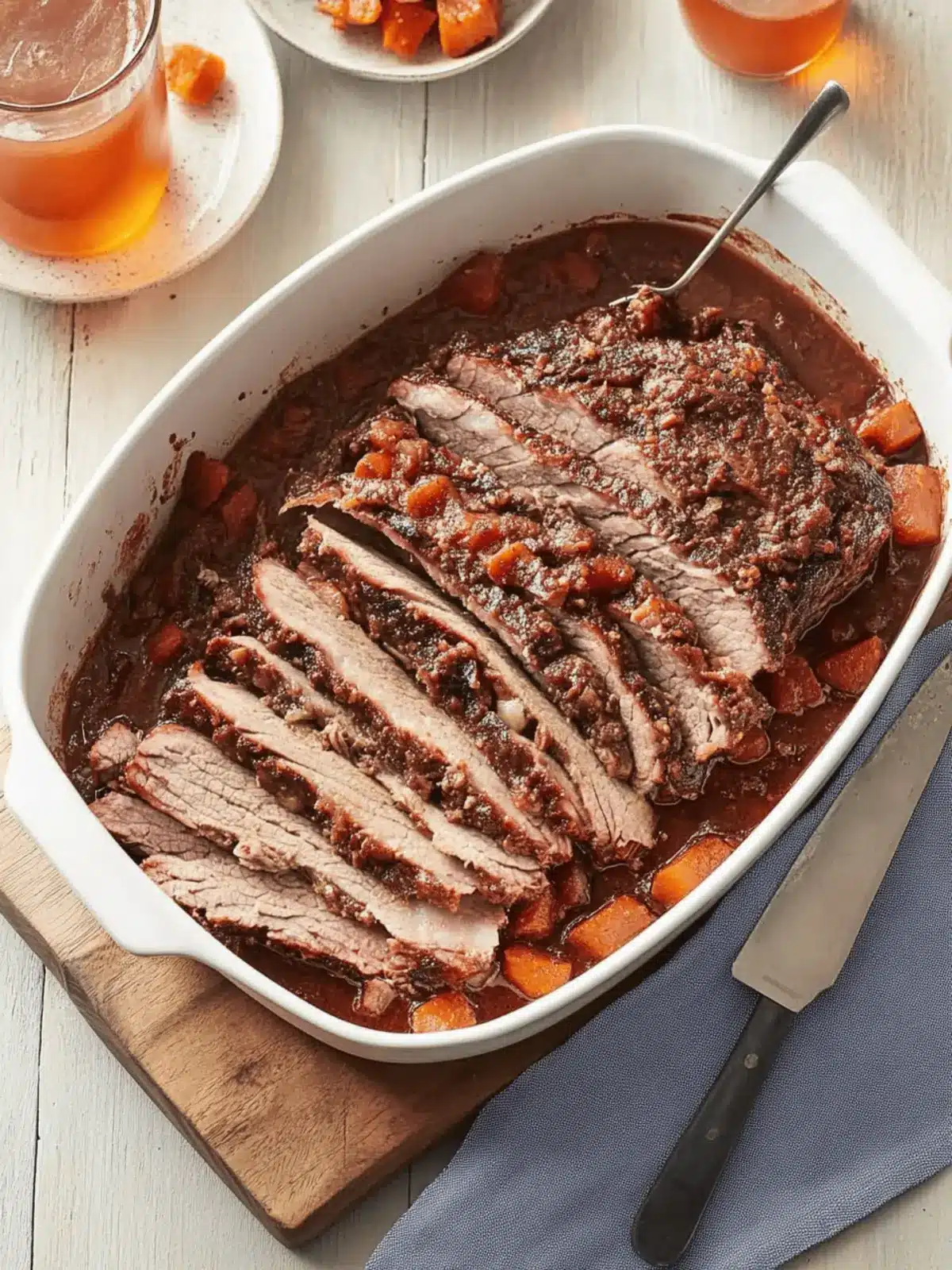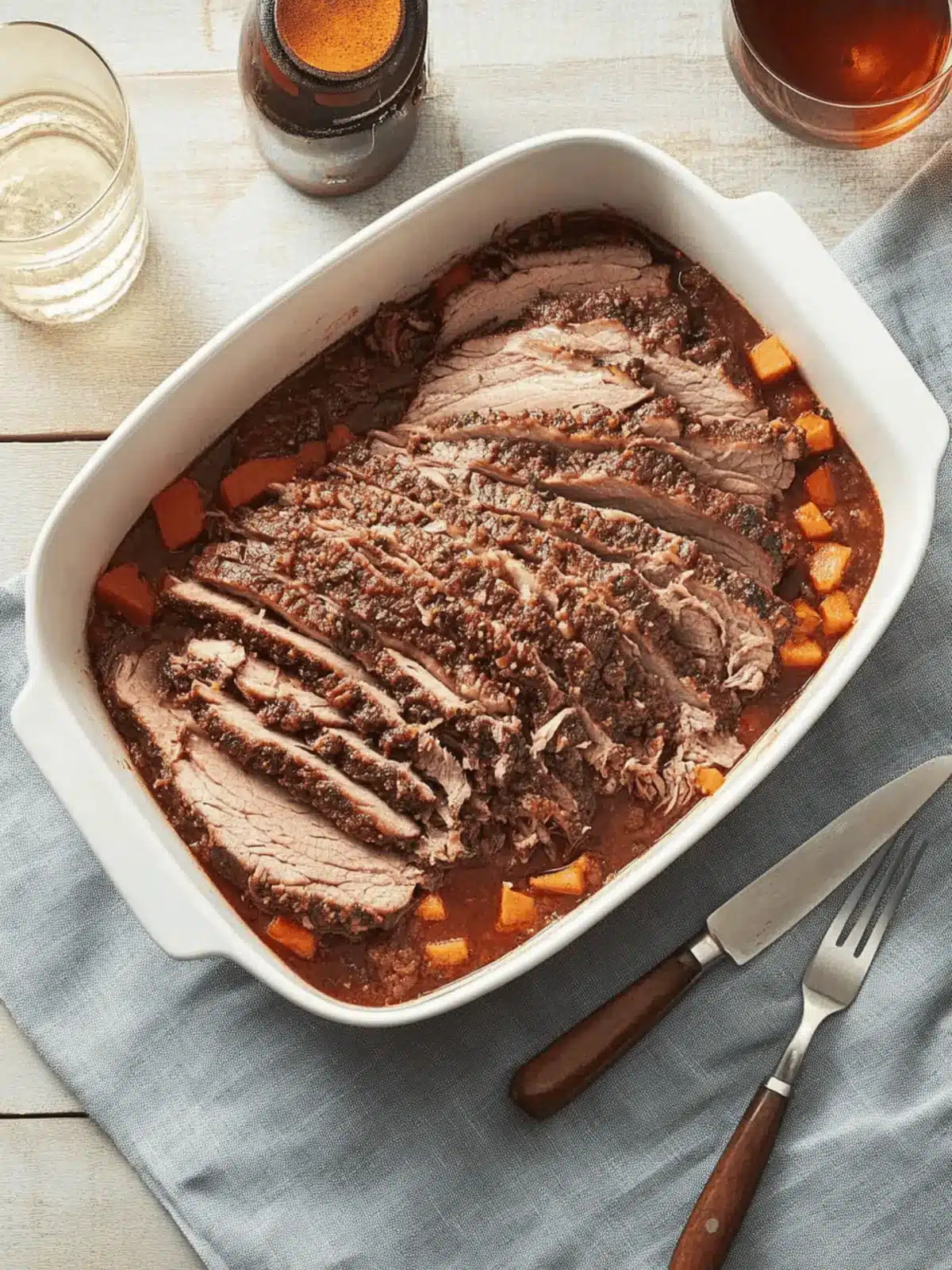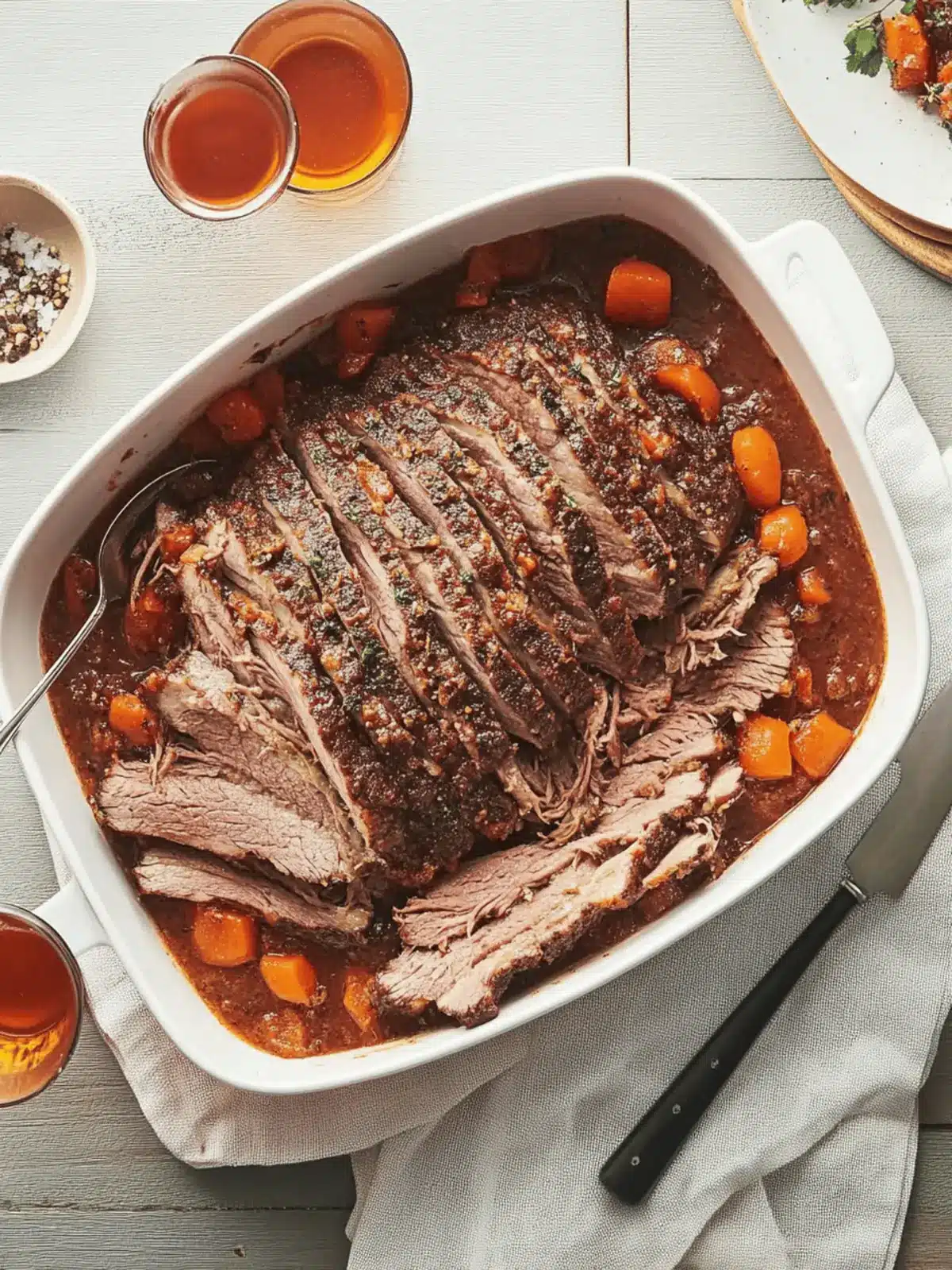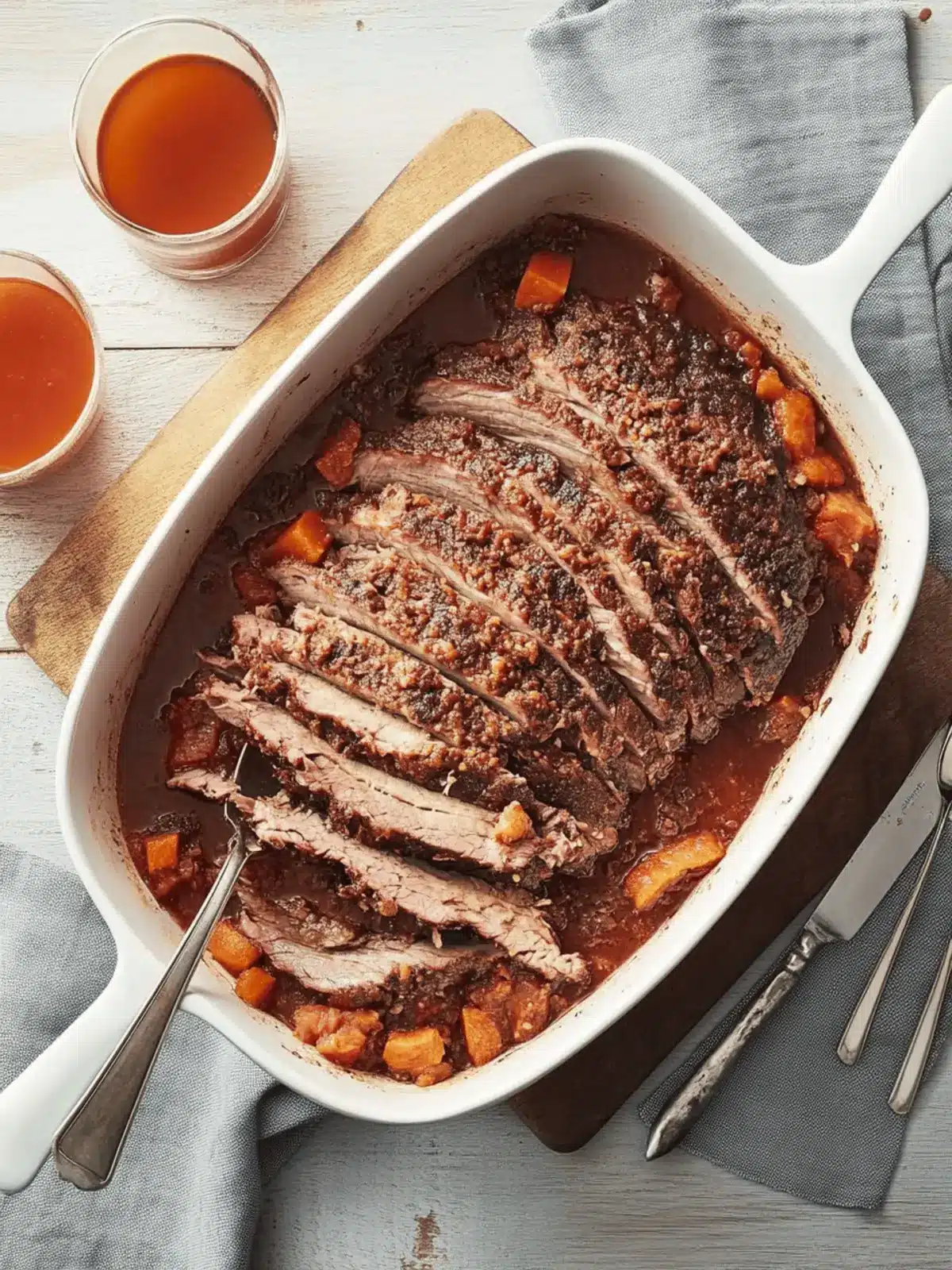The moment the rich aroma of garlic and thyme fills the kitchen, my heart swells with nostalgia. This Jewish Brisket recipe has been passed down through generations, and each bite evokes memories of family gatherings, laughter echoing against the walls, and the magical warmth of love served on a plate. I found this comforting dish one chilly evening when I craved something hearty and fulfilling—a satisfying antidote to the convenience of takeout.
What sets this brisket apart is its simplicity. With just a handful of ingredients, you can transform a humble cut of meat into an elegant centerpiece that will impress even the most discerning guests. The combination of red wine and crushed tomatoes creates a sumptuous sauce, while the slow simmering process ensures the brisket is tender and packed with flavor.
Join me in creating a dish that not only fills your home with tantalizing scents but also brings loved ones together at the dinner table. This Jewish Brisket is not just a meal; it’s a celebration of tradition, community, and the comfort of homemade food.
Why is Jewish Brisket a Family Favorite?
Comforting, this Jewish Brisket recipe envelops your kitchen with heavenly aromas, instantly making it a must-try. Hearty ingredients like tender brisket, robust red wine, and fresh herbs harmonize beautifully for a dish that pleases any palate. Effortless preparation allows even beginner cooks to shine, while long hours of simmering ensure a melt-in-your-mouth texture that’s perfect for gatherings. This dish isn’t just about food; it’s about creating cherished moments around the table with loved ones, away from fast food distractions.
Jewish Brisket Ingredients
For the Brisket
• First-cut beef brisket – choose a cut weighing 4 to 5 pounds for the best flavor and tenderness.
• Olive oil – 1 teaspoon, perfect for searing the brisket and adding richness.
• Kosher salt – 1 teaspoon to enhance and balance the flavors.
For the Aromatics
• Minced garlic – 2 teaspoons infuse the dish with a fragrant warmth that complements the beef.
• Dried thyme – 1 teaspoon, offering a delightful herbaceous note that elevates the dish.
• Freshly ground black pepper – ¼ teaspoon for a subtle kick of flavor.
For the Vegetables
• Chopped onions – 2 cups, which become sweet and caramelized during cooking, adding depth.
• Carrots – 4 large, peeled and thickly sliced for a hearty texture and beautiful color.
• Bay leaves – 3, crucial for adding an aromatic essence to the sauce.
For the Sauce
• Crushed tomatoes – 1 (28-ounce) can, providing a rich base for the sauce—essential for the best Jewish brisket.
• Tomato paste – 3 tablespoons (optional) for an intensified tomato flavor.
• Low-sodium beef or chicken broth – 1 cup to ensure moisture without overwhelming saltiness.
• Red wine – 1 cup, a key ingredient that enriches the sauce’s complexity and depth.
For Garnish
• Italian flat-leaf parsley – 2 tablespoons, finely chopped (optional), to brighten up and decorate your dish before serving.
How to Make Jewish Brisket
-
Heat oil – Start by heating 1 teaspoon of olive oil in a large pot over medium heat, creating the perfect base for flavor.
-
Cook garlic – Add 2 teaspoons of minced garlic and cook until fragrant. You’ll notice a wonderful aroma filling your kitchen, setting the stage for what’s to come!
-
Add herbs – Stir in 1 teaspoon of dried thyme and ¼ teaspoon of freshly ground black pepper. This combination will enhance the richness of the brisket beautifully.
-
Sear brisket – Gently add the 4 to 5-pound first-cut beef brisket to the pot and sear on all sides until browned, about 4-5 minutes each side for a lovely crust.
-
Remove brisket – Carefully remove the brisket from the pot and set it aside, allowing it to rest while you prepare the vegetables.
-
Cook onions – Add 2 cups of chopped onions to the pot, cooking until they turn translucent, about 5-7 minutes. This step adds sweetness to your dish.
-
Add vegetables – Stir in 4 large sliced carrots, 3 bay leaves, and 3 tablespoons of tomato paste (if using). Mix everything together until combined and fragrant.
-
Pour in liquids – Pour in 1 cup of low-sodium beef or chicken broth and the entire can of crushed tomatoes. Bring the mixture to a gentle simmer; the colors will start to pop!
-
Return brisket – Place the seared brisket back in the pot, ensuring it is submerged in the flavorful liquid.
-
Add wine – Pour in 1 cup of red wine, stirring well to combine. The wine adds complexity and depth, making your sauce irresistible.
-
Cover and simmer – Cover the pot and let it simmer for several hours until the brisket is tender, typically around 3 to 4 hours. Just wait until it’s fork-tender and simply melts in your mouth.
-
Garnish and serve – Before serving, garnish the dish with 2 tablespoons of finely chopped Italian flat-leaf parsley for a fresh, vibrant finish.
Optional: Serve alongside mashed potatoes or crusty bread to soak up the delicious sauce.
Exact quantities are listed in the recipe card below.
Tips for the Best Jewish Brisket
-
Searing Technique: Ensure the pot is hot enough before adding the brisket; a good sear locks in flavors and moisture.
-
Simmering Time: Don’t rush the cooking process; allowing the Jewish brisket to simmer for several hours will ensure it becomes tender and flavorful.
-
Broth Choice: Opt for low-sodium beef or chicken broth to maintain control over the saltiness of the dish, enhancing the brisket’s natural flavors.
-
Wine Quality: Use a good-quality red wine; it’s a vital ingredient that enhances the sauce’s complexity and the brisket’s overall taste.
-
Vegetable Prep: Chop vegetables uniformly for even cooking; larger pieces may become undercooked while smaller ones may dissolve.
How to Store and Freeze Jewish Brisket
Fridge: Keep cooked Jewish brisket in an airtight container for up to 3 days. This method helps retain its moisture while the flavors deepen.
Freezer: For longer storage, freeze the brisket in an airtight container for up to 3 months. Make sure the sauce covers the brisket to prevent freezer burn.
Thawing: When you’re ready to enjoy it again, thaw the brisket overnight in the fridge before reheating.
Reheating: Reheat the brisket on the stovetop over low heat or in the oven at 300°F until warmed through, ensuring it remains juicy and tender.
Jewish Brisket Variations & Substitutions
Feel free to add your own twist to this classic recipe and make it truly your own!
- Dairy-Free: Substitute red wine with additional broth to keep it flavorful while making it suitable for dairy-sensitive diets.
- Vegetable Boost: Incorporate diced potatoes or parsnips along with the carrots for added texture and flavor.
- Heat It Up: Add a pinch of cayenne pepper or a splash of hot sauce to kick up the spice level, balancing beautifully with the sweetness of the onions.
- Herb Infusion: Swap dried thyme for fresh thyme or add rosemary for something a little different. Fresh herbs can elevate the dish with vibrant flavors.
- Tomato-Free: Use a combination of beef broth and a bit of soy sauce or Worcestershire sauce for a rich umami flavor without the tomatoes.
- Smoky Flavor: Introduce a teaspoon of smoked paprika to the pot when cooking the aromatics for a deliciously smoky variant.
- Different Meats: Try using a chuck roast instead of brisket for a slightly different flavor and texture while still maintaining that comforting essence.
- Sweet Touch: A tablespoon of brown sugar or honey will add a hint of sweetness, balancing the acidity from the tomatoes and wine.
Each variation offers a chance to explore new flavors while keeping the heart of this beloved dish intact!
What to Serve with Jewish Brisket?
Creating the perfect meal around Jewish Brisket is an inviting way to enhance its rich, comforting flavors and nourish your loved ones.
-
Creamy Mashed Potatoes: These velvety potatoes are classic companions, perfectly soaking up the luscious sauce for a delightful bite.
-
Honey Glazed Carrots: Sweet and tender, they mirror the savory notes of the brisket while adding a pop of color to your plate.
-
Roasted Brussels Sprouts: Crispy on the outside and tender on the inside, their slight bitterness cuts through the richness of the brisket beautifully.
-
Crusty Bread: A warm, rustic loaf allows everyone to savor every drop of sauce, inviting a sense of comfort and togetherness around the table.
-
Coleslaw: The refreshing crunch of coleslaw adds a zesty contrast, balancing the hearty mouthfuls of brisket with a touch of brightness.
-
Red Wine: Pairing a glass of the same red wine you used in cooking elevates the meal, marrying the flavors into an exquisite dining experience.
-
Chocolate Mousse: End the meal on a sweet note with this indulgent dessert, a delightful contrast to the savory brisket you’ve just enjoyed.
Now you’re ready to create a harmonious dining experience that will bring everyone together for wonderful moments around the table!
Make Ahead Options
These Jewish Brisket preparations are a lifesaver for busy home cooks! You can slice the brisket and store it in an airtight container in the refrigerator up to 3 days ahead of time, ensuring it remains just as tender and flavorful. Additionally, you can also prepare the aromatic sauce (with onions, carrots, and spices) up to 24 hours in advance. Just mix everything in a pot, let it cool, and refrigerate. When ready to serve, simply reheat the sauce and return the brisket to the pot to warm through, allowing it to absorb all those delightful flavors. This way, you’ll enjoy a hassle-free, comforting meal with minimal effort when dinner time rolls around!
Jewish Brisket Recipe FAQs
How do I choose the right brisket?
Absolutely! When selecting a brisket, look for a first-cut that weighs between 4 to 5 pounds. Make sure it has a good amount of marbling—those thin streaks of fat throughout—because they keep the meat juicy during cooking. Also, avoid any cuts with dark spots or excessive gristle.
How should I store leftover Jewish brisket?
You can store cooked Jewish brisket in an airtight container in the refrigerator for up to 3 days. This method helps retain its moisture and allows the flavors to meld beautifully. Just remember to let it cool to room temperature before sealing it up!
Can I freeze Jewish brisket?
Yes, you can freeze it! To do so, place the brisket in an airtight freezer-safe container, ensuring it’s covered with sauce to prevent freezer burn. It will stay good for up to 3 months. Make sure to label it with the date so you can easily keep track.
What’s the best way to reheat Jewish brisket?
When you’re ready to enjoy your brisket again, the best method is to thaw it overnight in the fridge. Then, reheat it gently on the stovetop over low heat until warmed through. You can also place it in the oven at 300°F covered with foil to keep it moist. This way, it will remain tender and delicious.
Are there any dietary considerations I should keep in mind with brisket?
Very! Jewish brisket is generally safe for most diets, but check for allergies to specific ingredients, like gluten if you use certain broths or tomato products. Also, remember this dish is rich, so if you’re conscious about fat intake, consider trimming the brisket before cooking.
What should I do if the brisket turns out tough?
Don’t worry! If your brisket comes out tough, it simply needs more time to cook. Just put it back on the simmer and cover the pot. The key is low and slow; let it simmer on low heat for an additional hour or until it’s fork-tender. You can always add a bit more broth or wine if the liquid level gets low!

Mouthwatering Jewish Brisket for Cozy Family Dinners
Ingredients
Equipment
Method
- Heat 1 teaspoon of olive oil in a large pot over medium heat.
- Add 2 teaspoons of minced garlic and cook until fragrant.
- Stir in 1 teaspoon of dried thyme and ¼ teaspoon of freshly ground black pepper.
- Gently add the 4 to 5-pound first-cut beef brisket to the pot and sear on all sides until browned, about 4-5 minutes each side.
- Carefully remove the brisket from the pot and set it aside.
- Add 2 cups of chopped onions to the pot and cook until translucent, about 5-7 minutes.
- Stir in 4 large sliced carrots, 3 bay leaves, and 3 tablespoons of tomato paste, if using.
- Pour in 1 cup of low-sodium beef or chicken broth and the entire can of crushed tomatoes, bringing to a gentle simmer.
- Place the seared brisket back in the pot, ensuring it is submerged in the liquid.
- Pour in 1 cup of red wine, stirring well to combine.
- Cover the pot and let it simmer for 3 to 4 hours until the brisket is fork-tender.
- Before serving, garnish with 2 tablespoons of finely chopped Italian flat-leaf parsley.








